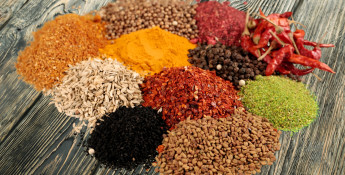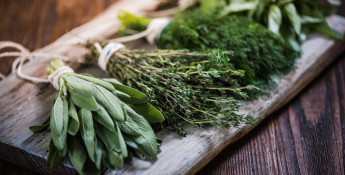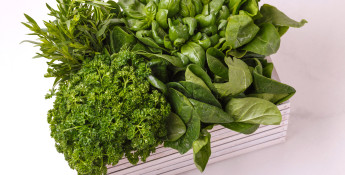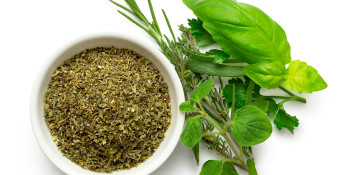By Chef Alli on July 27, 2020
Cooking with fresh herbs

Fresh herbs can make a so-so meal taste out of this world. When you're cooking with fresh herbs, use these tips to make sure they're the tastiest and freshest they can be ensuring your food tastes delicious.
Purchasing Fresh Herbs
If you purchase your herbs from a grocery store, try to purchase them as close to your cooking time as possible.
Look for herb bundles with vibrant color. Avoid limp and soggy bundles with any discoloration in the form of black spots or general yellowing. Grocery stores often overspray their produce to give the illusion of freshness, when in fact, excessive watering is exactly what fresh herbs and vegetables don’t need at this point in their journey to our dinner tables.
Storing Fresh Herbs
If you’re not using freshly snipped or purchased herbs immediately, you’ll want to pretreat them before you place into refrigeration at home. Immediately remove anything fastening your herbs together, such as a wire tie or a rubber band. Both gatherings can easily bruise fragile herbs, affecting their longevity and flavor.
Before you store your herbs in the fridge, wrap them in a paper towel to wick away moisture. Then, place the bundle into a loose, light-weight plastic bag (like the bags you use for purchasing produce at the grocer) or even a small brown sack.
Store the packaged herbs in the produce bin or drawer of your fridge where humidity is lessened.
When you’re ready to use the herbs, simply unwrap them, cutting away any wilted or discolored leaves. As you likely already know, fresh herbs don’t have a long shelf life so use them as quickly as possible.
Washing Fresh Herbs
Only rinse herbs if you’re going to use them immediately, otherwise store them in your fridge unwashed until you’re ready to incorporate into your cooking.
When you’re ready to use fresh herbs, fill a bowl with cold water and place your herbs inside, gently swishing them around in the water to remove any dirt.
If there is a significant amount of sediment at the bottom of the bowl, dump the water and give the herbs another rinse.
Gently pat the herbs dry by rolling them up tightly in a paper towel or give them a good whirl in a salad spinner, then proceed.
Chopping Fresh Herbs
A very sharp chef’s knife is a worthwhile investment that will last a lifetime if cared for properly. And, a sharp knife makes chopping and slicing ingredients much more enjoyable. Cooking is hard work and a quality chef’s knife is an essential tool.
When chopping or mincing fresh herbs, make sure the blade you are using is nicely sharpened and straightened. Chopping with a dull blade will bruise your herbs since you are essentially smashing them instead of cutting them. Kitchen shears are great for chopping herbs if you’re not concerned about achieving uniform pieces.
To maximize the flavor of your herbs you’ll want to chop or mince them for cooking use since each incision is exactly what causes herbs to release their power and essence. The finer you chop the herbs, the more oil (essence) is released, making the herbs stronger in flavor and aroma.
Delicate herbs like parsley and cilantro should be chopped right before use as they lose their aroma and flavor quickly.





